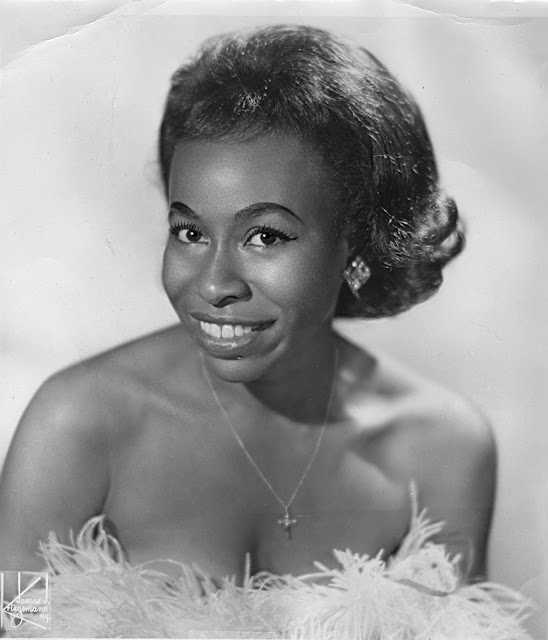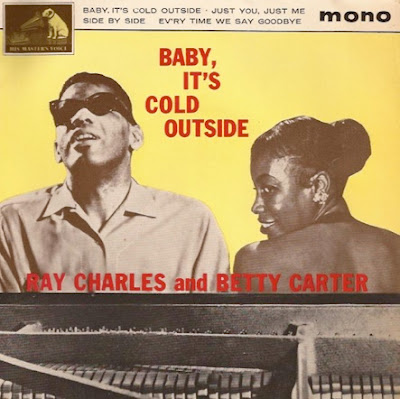Betty Carter (born Lillie Mae Jones; May 16, 1929 – September 26, 1998) was an American jazz singer known for her improvisational technique, scatting and other complex musical abilities that demonstrated her vocal talent and imaginative interpretation of lyrics and melodies. Vocalist Carmen McRae once remarked: "There's really only one jazz singer—only one: Betty Carter."
 Carter studied piano at the Detroit Conservatory of Music in her native Michigan. At age 16 she began singing in Detroit jazz clubs, and after 1946 she worked in black bars and theatres in the Midwest, at first under the name Lorene Carter.
Carter studied piano at the Detroit Conservatory of Music in her native Michigan. At age 16 she began singing in Detroit jazz clubs, and after 1946 she worked in black bars and theatres in the Midwest, at first under the name Lorene Carter.Influenced by the improvisational nature of bebop and inspired by vocalists Billie Holiday and Sarah Vaughan, Carter strove to create a style of her own. Lionel Hampton asked Carter to join his band in 1948; however, her insistence on improvising annoyed Hampton and prompted him to ![]() fire her seven times in two and a half years.
fire her seven times in two and a half years.
 fire her seven times in two and a half years.
fire her seven times in two and a half years.Carter left Hampton’s band for good in 1951 and performed around the country in such jazz clubs as Harlem’s Apollo Theatre and the Vanguard in New York, the Showboat in Philadelphia, and Blues Alley in Washington, D.C., with such jazz artists as Charlie Parker, Dizzy Gillespie, Miles Davis, Muddy Waters, T-Bone Walker, and Thelonious Monk.
In 1961 Ms. Carter recorded what has become a classic album, ''Ray Charles and Betty Carter,'' with Mr. Charles; it features the pair singing astringent duets including a famous version of ''Baby, It's Cold Outside.'' Ms. Carter worked with Mr. Charles from 1960 to 1963, the year she toured Japan with Sonny Rollins and recorded an orchestral album for Atco Records.
Through the 1960's Ms. Carter struggled with her career, recording with Roulette Records in the late 1960's, during which the avant-garde and pop music rendered some artists identified with an older style commercially irrelevant. Carter put her career on hold to get married. Her marriage did not last, however, and she returned to the stage in 1969 backed by a small acoustic ensemble consisting of piano, drums, and bass. In 1971 she released her first album on her own label, Bet-Car Productions.
Beginning in the 1970s, Carter performed on the college circuit and conducted several jazz workshops. After appearing at Carnegie Hall as part of the Newport Jazz Festival in 1977 and 1978, she went on concert tours throughout the United States and Europe. Her![]() solo albums include Betty Carter (1953), Out There (1958), The Modern Sound of Betty Carter (1960), The Audience with Betty Carter (1979).
solo albums include Betty Carter (1953), Out There (1958), The Modern Sound of Betty Carter (1960), The Audience with Betty Carter (1979).
In 1988 Ms. Carter began a relationship with Verve Records that included the reissue of the Bet-Car label along with the recording of a series of new albums. That same year she released ''Look What I Got!,'' which won a Grammy, and in 1994 she recorded an album, ''Feed the Fire,'' with the pianist Geri Allen, the bassist Dave Holland and the drummer Jack DeJohnette.
Also during the 1980's Ms. Carter, finally recognized for her innovations, became a concert draw internationally. She recorded duets with Carmen McRae, and she kept turning out well-rounded musicians, having trained them in her trio. Included in the alumni from the 1980's and the 1990's were the pianists Cyrus Chestnut,![]() Benny Green, Stephen Scott, Marc Cary, Darrell Grant and Travis Shook. And her choice of drummers was extraordinary, having hired Greg Hutchinson, Clarence Penn, Winard Harper, Troy Davis and Lewis Nash.
Benny Green, Stephen Scott, Marc Cary, Darrell Grant and Travis Shook. And her choice of drummers was extraordinary, having hired Greg Hutchinson, Clarence Penn, Winard Harper, Troy Davis and Lewis Nash.
Determined to encourage an interest in jazz among younger people, in April 1993 Carter initiated a program she called Jazz Ahead, an annual event at which 20 young jazz musicians spend a week training and composing with her. In 1997 she was awarded a National Medal of Arts by U.S. President Bill Clinton.
Through the 1960's Ms. Carter struggled with her career, recording with Roulette Records in the late 1960's, during which the avant-garde and pop music rendered some artists identified with an older style commercially irrelevant. Carter put her career on hold to get married. Her marriage did not last, however, and she returned to the stage in 1969 backed by a small acoustic ensemble consisting of piano, drums, and bass. In 1971 she released her first album on her own label, Bet-Car Productions.
Beginning in the 1970s, Carter performed on the college circuit and conducted several jazz workshops. After appearing at Carnegie Hall as part of the Newport Jazz Festival in 1977 and 1978, she went on concert tours throughout the United States and Europe. Her
 solo albums include Betty Carter (1953), Out There (1958), The Modern Sound of Betty Carter (1960), The Audience with Betty Carter (1979).
solo albums include Betty Carter (1953), Out There (1958), The Modern Sound of Betty Carter (1960), The Audience with Betty Carter (1979).In 1988 Ms. Carter began a relationship with Verve Records that included the reissue of the Bet-Car label along with the recording of a series of new albums. That same year she released ''Look What I Got!,'' which won a Grammy, and in 1994 she recorded an album, ''Feed the Fire,'' with the pianist Geri Allen, the bassist Dave Holland and the drummer Jack DeJohnette.
Also during the 1980's Ms. Carter, finally recognized for her innovations, became a concert draw internationally. She recorded duets with Carmen McRae, and she kept turning out well-rounded musicians, having trained them in her trio. Included in the alumni from the 1980's and the 1990's were the pianists Cyrus Chestnut,
 Benny Green, Stephen Scott, Marc Cary, Darrell Grant and Travis Shook. And her choice of drummers was extraordinary, having hired Greg Hutchinson, Clarence Penn, Winard Harper, Troy Davis and Lewis Nash.
Benny Green, Stephen Scott, Marc Cary, Darrell Grant and Travis Shook. And her choice of drummers was extraordinary, having hired Greg Hutchinson, Clarence Penn, Winard Harper, Troy Davis and Lewis Nash. Determined to encourage an interest in jazz among younger people, in April 1993 Carter initiated a program she called Jazz Ahead, an annual event at which 20 young jazz musicians spend a week training and composing with her. In 1997 she was awarded a National Medal of Arts by U.S. President Bill Clinton.
Carter continued to perform, tour, and record, as well as search for new talent until she was diagnosed with pancreatic cancer in the summer of 1998. She died on September 26, 1998, at the age of 69, and was later cremated.
(Info compiled and edited from Wikipedia, Britannica.com & NY Times obit)
Here's a 1990 performance of "Droppin' Things"
(Info compiled and edited from Wikipedia, Britannica.com & NY Times obit)
Here's a 1990 performance of "Droppin' Things"


